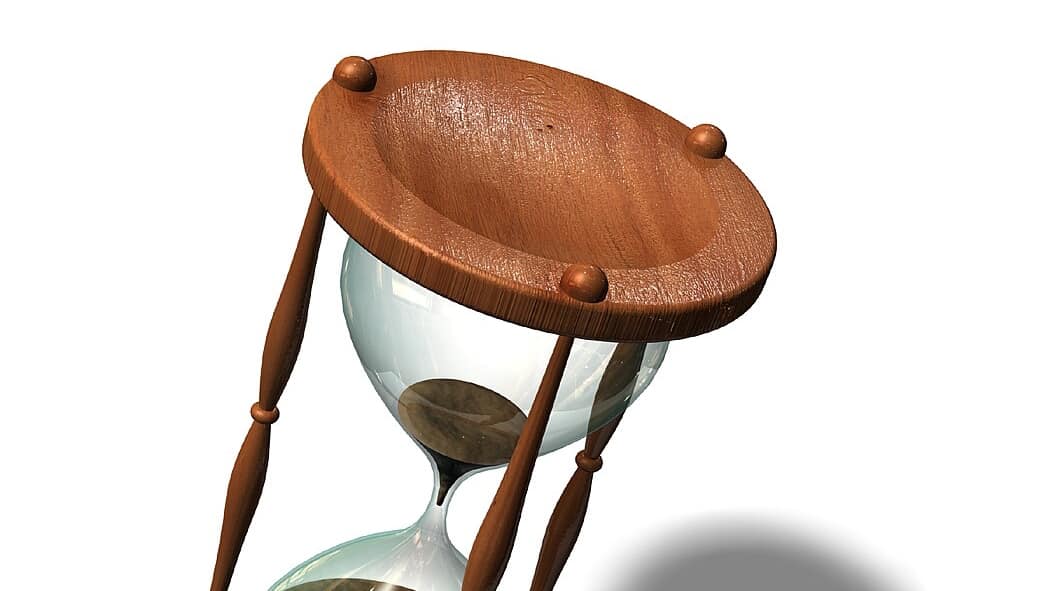Does time really move faster when we are late for an appointment and trapped in a traffic jam but slower when we are sitting in a dentist’s chair having a tooth drilled? Does it start out slow in childhood, pick up speed in adulthood, and race by when we grow old? Or does it only seem to behave that way?
How strange that something so important as time is often misunderstood or taken for granted. The ancient Greeks said time is infinite. Jews and Christians said, “No, only God is infinite, and everything else, including time, is created and therefore finite.”
Some philosophers have defined time as simply a mental construct or concept. Others have disagreed, claiming it is an objective reality. Sir Isaac Newton sided with the latter, regarding time as the dimension of reality in which events occur sequentially.
The field of knowledge we call history supports Newton’s view. Historians tell us, for example, that Julius Caesar was murdered on the Ides (15th) of March in 44 B.C. and that the Declaration of Independence was declared on July 2, approved on July 4, and signed in August 2, 1776. If time were subjective, it would not be possible to speak with such certainty. We would instead have to say that any dates a person chose would be as correct as any others.
Furthermore, if time were truly subjective rather than objective, whether one act came before or after another would be a matter of personal preference rather than fact, so it would be pointless to research a sequence of events, let alone explore their relationship. Accordingly, the concepts of correlation and causation would be meaningless.
At a more fundamental level, if time were subjective, people would have no need of calendars and watches because whatever they thought to be the month, year, and hour would necessarily be correct. Imagine the confusion that would cause.
If it makes sense to understand time as an objective reality (even as we wonder about how we perceive it), it makes even more sense to examine how human progress has affected our relationship with time.
Before the nineteenth century, virtually every significant task of daily living was considerably more time-consuming than it is today. Most waking hours were spent laboriously planting and harvesting crops, tending farm animals, and plying trades with rustic tools. The preparation of food was a time-consuming process. Washing clothes was laborious, as were pumping and carrying water.
Travel in previous centuries was so time-consuming that most people lived their entire lives without venturing more than short distances from the places where they were born. To walk to a town fifteen miles away and then return home took ten hours; even traveling the same distance by horseback at a moderate pace took six or seven hours.
Since the nineteenth century, human genius has enabled us to save time in the performance of our tasks. Timesaving inventions progressed from the steam locomotive to the automobile and airplane; the printing press to the typewriter, telegraph, telephone, and computer; the wood stove and ice box to the convection oven and the refrigerator-freezer-icemaker. And so on.
The saving of time brought later generations something that more distant ancestors could only dream of—leisure, and with it the opportunity to cultivate their minds. More and more people had the time to explore the various areas of knowledge, notably history, the sciences, humanities, and social sciences for themselves and not remain intellectually dependent on the well-educated elites. (In poor countries, such leisure and opportunity still do not exist.)
Leisure also permitted those later generations to ponder the questions of good and evil, right and wrong, wisdom and foolishness that are essential to personal growth and honorable living.
But then, over time, something strange and profoundly ironic happened. The same inventiveness that saved time produced the means to squander it; and mass culture, with its emphasis on self-indulgence, added the inclination to do so.
Today more and more people, particularly young people, squander time in playing video games, accumulating “selfies,” obsessing over the lives of celebrities, texting and tweeting trivial messages, and surrendering their minds to inane TV comedies with laugh tracks that guide their responses. As a result, they are profoundly ignorant of past and current events and uninterested in ideas and ideals, including those that directly impact their lives.
Like our ancestors, we are embedded in time. It marks the beginning and end of our earthly existence. Everything we think and say and do takes place in time, and we are powerless to work outside its limitations. Nevertheless, our ancestors, through arduous effort, enabled us to accomplish more within those limitations. The question is whether we will prove ourselves worthy of their legacy.
Copyright © 2016 by Vincent Ryan Ruggiero. All rights reserved








